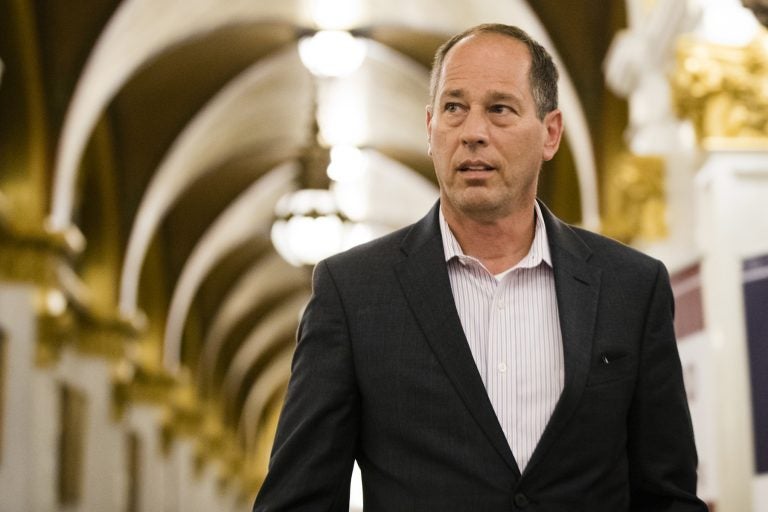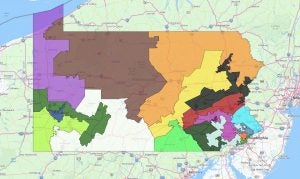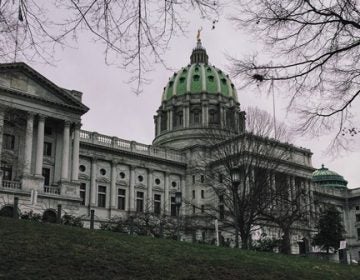State government standoff: Pennsylvania’s ‘constitutional crisis’ over court’s redistricting decision
Listen 0:00
Senate President Pro Tempore Joe Scarnati. (AP file Photo/Matt Rourke)
Friday is the court-imposed deadline for the Pennsylvania legislature to agree on a new congressional district map.
But the legislature wasn’t in session Wednesday or Thursday this week, even though procedural rules would suggest they needed to be there to progress through the necessary parliamentary steps in time.
Republican leaders now say they are planning to send the governor a map without getting a full floor vote — or bothering to ask the state Supreme Court for an extension.
The legislature was ordered to redraw the map by the majority Democratic Pa. Supreme Court, which in late January declared the current one an unconstitutional partisan gerrymander in a 5-2 party line decision. The existing map was drawn in 2011 during a process controlled by Republicans.
Since the decision, statehouse Republicans have tried many tactics to avoid complying with the ruling, including some that seem to undermine the legitimacy of the court.
The court’s initial decision was three pages long. It did not detail how the map violated the state constitution, nor did it offer specific criteria for one that would be constitutional.
This was a source of frustration for Senate President Pro Tempore Joseph Scarnati that grew each day without a full opinion.
“We have no guidance from the Pennsylvania Supreme Court. None,” Scarnati said, Tuesday, 15 days after the initial ruling. “They’ve given us a very tight timeline to begin with. Let alone…with no guidance.”
The 139 page full opinion came late Wednesday, more than two weeks after the first order.
Scarnati, a Jefferson County Republican, had at that point already responded in relatively hostile fashion, refusing to provide data requested by the court.
Widender Law School Professor John Gedid says the court could, technically, hold Scarnati in contempt — but probably won’t.
“It may be a matter of, as one of three branches of government, that the court itself is [recognizing] there is separation of powers,” Gedid said. “They may not want to try to force it out of the legislature.”
Scarnati and leaders in the House also made an emergency appeal to the U.S. Supreme Court, even though the case focused solely on the Pennsylvania constitution. That plea was ultimately rejected by U.S. Supreme Court Justice Samuel Alito.
Top Republicans also took aim at some justices on the state court, saying some were too biased to make an impartial decision.
State Rep. Cris Dush took it a step further. He circulated a memo to House Republicans earlier this week calling for the impeachment of all five Democratic justices who voted to overturn the map.
Critics swarmed his office at the capitol on Tuesday, before anyone had even started drafting legislation.
Later that same day, Dush didn’t bring up impeachment during a committee meeting about the map.
He did, however, talk about again appealing to the feds if the court takes over the mapmaking process. He thinks the court over-reached by imposing a deadline on lawmakers and saying the court itself will draw the map if they don’t meet it.
Gedid says that’s probably a dead end, though, because federal courts generally don’t get involved in matters that are strictly limited to state constitutional law — like this case.
Republicans also criticized the state court for giving Gov. Tom Wolf six days to review their map, when there’s normally a 10-day review period.
And the order also doesn’t seem to allow time for a vetoed map to come back to the General Assembly, as is typical procedure for legislation.
“This arbitrary deadline that the Supreme Court has passed is unconstitutional,” Dush said during the meeting. “They have the right to make the decision about whether or not it’s come to a decision about whether or not it’s constitutional. The other steps that they’ve taken are way beyond the pale.”
In its majority opinion, the court argued it has “broad authority to craft meaningful remedies.”
What that exactly means continues to be a source of debate.
In a split opinion, Justice Max Baer wrote that even though the map is unconstitutional, so is the remedy ordered by his Democratic colleagues. Baer says it violates the due process clause.
Gedid says procedural timelines are scripted into the state constitution.
“It could be argued that it’s unconstitutional, forcing this timetable on them,” Gedid said.
And with federal courts unlikely to provide recourse?
“You’ve got a real constitutional crisis,” Gedid said. “You’ve got a standoff.”
Meanwhile, Dush says that his concern is about the court overstepping its power, not gerrymandering.
“I don’t think these maps were done properly. I think there is a problem with the current map,” he said, adding that it’s also impossible to completely remove politics from the redistricting process.
Dush spoke with Keystone Crossroads by phone Thursday from his office in Indiana County, 200 miles away from Harrisburg, on 12-hour callback to the capitol.
WHYY is your source for fact-based, in-depth journalism and information. As a nonprofit organization, we rely on financial support from readers like you. Please give today.






